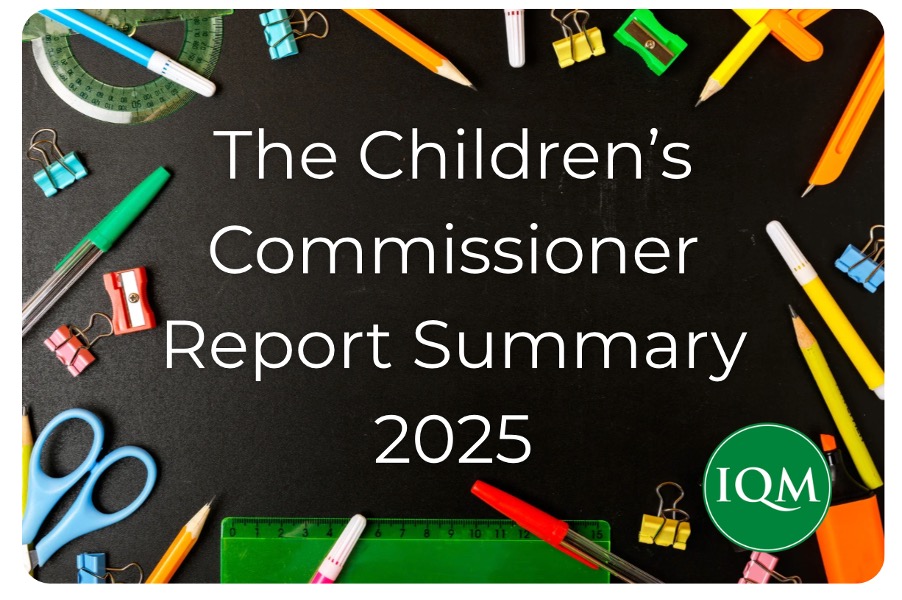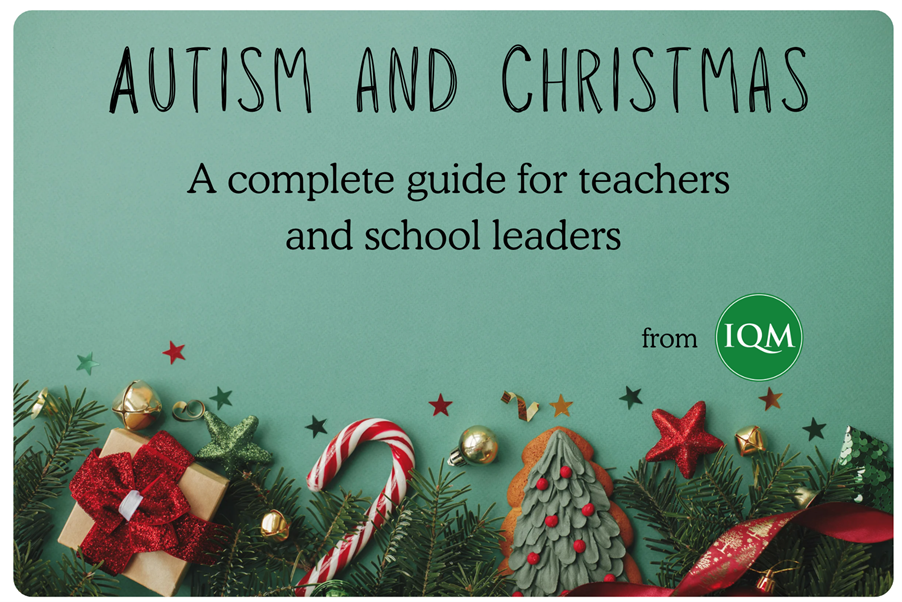Who is IQM?
IQM is the only national inclusion award in the UK. For over 20 years and in over 20 countries, schools, MATs and Local Authorities use the Inclusion Quality Mark to recognise exemplary inclusive practice.
Get in touch for your FREE school information pack today.
The Children’s Commissioner Report 2025: What this means for mainstream inclusion
September 8, 2025

The Children’s Commissioner Report 2025 landed this morning (8th September), and it’s already making waves across the sector.
Drawing on insights from over 18,500 mainstream schools and colleges, the report captures the realities of supporting children (aged 2–18), their vulnerabilities, needs, and the pressures schools face daily.
For those of us committed to inclusion, it’s a reminder that the landscape is shifting. A confirmation of what you’ve probably felt in your own corridors: needs are becoming more complex, more children require support, and schools are continuing to step into roles that health and social care can’t always cover.
Sound familiar?
In this blog, we’ll break down the Children’s Commissioner Report recommendations and what they mean for your school, with a particular focus on SEND and inclusion.
A summary of the statistics found for SEND children
The census data doesn’t tell us anything we haven’t already seen in classrooms across England, but it does underline just how significant the challenge has become for all school staff.
- 37% of children need additional support with learning at some point in their school career
- 1 in 4 pupils will have contact with a social worker while at school
- Over one million pupils miss at least one day of school every fortnight, with absence hitting SEND pupils hardest
- Children with SEND are still less likely to achieve expected outcomes at every Key Stage
- Areas of higher deprivation report higher SEND identification and greater challenges in meeting needs
Taken together, these figures show what many school leaders and SENDCos have been saying for years: the system simply isn’t keeping pace with the growing scale and complexity of need.
The pandemic accelerated some of these changes, particularly around SEMH needs and speech and language difficulties, and the demand for specialist support is only increasing.
For school leaders, the question isn’t if things will change, but how quickly and creatively schools can adapt to stay inclusive. Thinking caps at the ready.

The Children’s Commissioner’s Report: The seven recommendations
So, what does the report actually propose? Below, we’ve broken down the seven recommendations and what they could mean for you as a mainstream school leader.
Recommendation one: A national statement of ambition for all children
 This is about raising the bar. A vision for every child in England that’s ambitious, not just in academic attainment but also in attendance, engagement, and progress.
This is about raising the bar. A vision for every child in England that’s ambitious, not just in academic attainment but also in attendance, engagement, and progress.
For leaders, this suggests a system where you’ll be measured not only by outcomes, but by how well you help pupils to stay present and engaged in their learning.
Worth noting: the new Ofsted Inspection Handbook is due soon, and it’s not hard to imagine these priorities being reflected in inspection criteria.
Recommendation two: A new focus on a broader range of additional needs
 The report proposes a Unique ID system, giving professionals across education, health, and justice a clearer picture of each child’s background. For example, if a parent is in prison, schools and social care would know and could support accordingly.
The report proposes a Unique ID system, giving professionals across education, health, and justice a clearer picture of each child’s background. For example, if a parent is in prison, schools and social care would know and could support accordingly.
It also suggests a new definition of ‘additional needs’, expanding support beyond the narrow categories currently used, backed by a framework of entitlements to make sure children don’t slip through the cracks.
Finally, the Children’s Commissioner calls for a clinically-led review of neurodevelopmental diagnoses to stop the postcode lottery so many families face. For leaders, this means children and families experiencing a more consistent approach to referrals and assessments in the future.
Recommendation three: Extra help for schools to deliver targeted and specialist support
 If schools are on the frontline, they need proper tools and funded resources. This recommendation includes a funding premium for inclusion, ensuring resources follow the child, plus a core universal offer so parents know what support to expect from any school.
If schools are on the frontline, they need proper tools and funded resources. This recommendation includes a funding premium for inclusion, ensuring resources follow the child, plus a core universal offer so parents know what support to expect from any school.
There’s also an emphasis on building a stronger evidence base for inclusion and scaling what works. And because staff confidence makes all the difference, the report calls for more specialist training to help teachers spot needs early and respond effectively.
Recommendation four: A new approach to statutory education support (EHCPs)
 This is a big one. The report proposes a tiered model of statutory support:
This is a big one. The report proposes a tiered model of statutory support:
- An Education Plan for pupils needing extra help but not lifelong provision
- An EHCP for more complex, enduring needs or multi-agency cases
- An automatic EHCP for children with life-limiting conditions
The goal is to avoid the “all or nothing” dilemma and make support more responsive. Crucially, it also highlights the need for earlier intervention, including milestone checks at 12 months, 2 years, and 5 years, and the option of Reception Plus (an additional year in reception) for children not yet school-ready.
Recommendation five: Local Opportunity Mission Delivery Boards
 This recommendation pushes accountability closer to home. It proposes:
This recommendation pushes accountability closer to home. It proposes:
- A Specialist Support Fund, pooled from education, health, and social care, to get funding where it’s needed most, in classrooms
- A secure digital platform to improve data-sharing across services
- Greater local leadership, with Directors of Education in every local authority and, where appropriate, more involvement from regional mayors
- Education being formally recognised as the fourth statutory safeguarding partner
For leaders, this could mean more local collaboration, as well as increased local accountability.
Recommendation six: The critical role of special schools and alternative provision
 The report values Alternative Provision (AP) and special schools but sees them as part of a continuum, not a last resort.
The report values Alternative Provision (AP) and special schools but sees them as part of a continuum, not a last resort.
- An assumed path back to mainstream wherever appropriate
- A day one right to access AP, so families aren’t left waiting often in times of crisis
- More investment in internal AP in mainstream schools, like, nurture bases, specialist units
This recommendation reinforces that inclusion isn’t about either/or. It’s about making sure children get the right support, in the right place, at the right time.
Recommendation seven: Services beyond the school gate
 Finally, the Children’s Commissioner report looks beyond schools. This includes reforms to social care, CAMHS, youth services, and youth justice, plus:
Finally, the Children’s Commissioner report looks beyond schools. This includes reforms to social care, CAMHS, youth services, and youth justice, plus:
- Annual health reviews for all children
- Violence Reduction Units in every local area
- A shift to treating justice-involved children with a safeguarding lens, not a purely punitive one
For schools, this could mean closer links with external services and, hopefully, less of the burden falling on your school pastoral and teaching staff alone.

A finishing thought
The 2025 Children’s Commissioner Report is both a wake-up call and a roadmap. It asks leaders to reimagine inclusion not just as compliance, but as culture.
So, are your systems ready for a future where every child has a plan, families are better supported, and inclusion is central to school improvement?
At IQM, we know inclusion isn’t just a strategy. It’s the heartbeat of a successful school.
This report underlines why investing in that heartbeat matters now more than ever. If you’re ready to explore how your school can recognise exemplary inclusive practice, strengthen its approach, and prepare for the changes ahead, get in touch with our team today.
More articles you’ll like:
Staff induction plans for middle and senior leaders in schools
Starting secondary school with autism and ADHD: A Mum’s perspective
Other Posts

About IQM
The only national award for inclusion in the UK, IQM has been committed to recognising exemplary inclusive schools for over 20 years and in over 20 countries around the world. The three awards allow schools and organisations to celebrate their inclusive practice against nationally recognised framework.
Site Links
© 2026 Inclusion Quality Mark | website developed & cared for by digidoda


